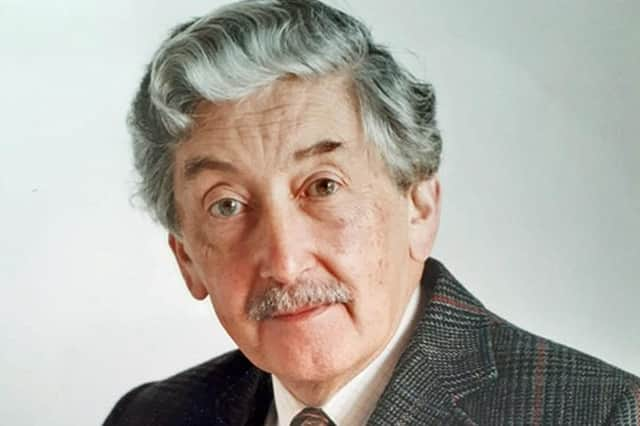Obituary: Otto Hutter, Austrian-born scientist who demonstrated how heartbeat worked


We record with deep regret the death of Otto Hutter, Emeritus Regius Professor of Physiology at Glasgow University, at his home in Bournemouth. Born in 1924 in Vienna, he was 96.
Growing up in a Jewish family, Otto enjoyed a happy childhood in Vienna. His family lived on the Lilienbrunngasse, a street in the Leopoldstadt area, very near the Danube with the city centre beyond. Normal life was shattered after March 1938 by the Anschluss, Hitler’s annexation of Austria. However, aged just 14, Otto was to become one of the very last children with no personal connections in the UK permitted to escape Vienna through the Kindertransport. He was number 359 of 360 children put on the train to reach Britain: he kept the numbered ticket all his life. Within just a few years, some 493 Jewish men, women and children from just this one street were to die in the Holocaust, including nearly all Otto’s family.
Advertisement
Hide AdAdvertisement
Hide AdAfter the escape to the UK, Otto Hutter was to become a world-renowned biomedical scientist, researching and teaching in physiology. He is most widely known for having discovered the physiological basis for the nervous control of the heart’s pacemaker function: how different nerve fibres can slow down and speed up heart rate. Otto, with Wolfgang Trautwein, in the 1950s was the first to report in detail the electrical behaviour of the heart’s natural pacemaker cells. Using early microelectrode methods, they revealed the slowing and speeding of the pacemaker’s spontaneous electrical rhythm as influenced by stimulating the vagus or sympathetic nerves (or as evoked by the chemical neurotransmitters those nerves release). The traces they recorded quickly became true textbook icons in medicine and bioscience. Otto’s subsequent studies of the underlying mechanisms furthered his interest in the electrophysiology of potassium and anion conductance channels, notably in skeletal muscle. His work, with many colleagues in what is by now a large scientific “family”, expanded this research field considerably. It became a key and still-growing area that underpins much progress in electrophysiology, for example for understanding the actions of drugs with special relevance in cardiology.
On arriving in England in 1938, Otto was fostered near Colchester. He completed his schooling at Bishop’s Stortford College, funded through a generous refugee scholarship by the school’s Old Boy’s Association. Describing himself as “not physically robust enough” for the Pioneer Corps, the only option for a refugee to “join up”, he volunteered for “essential war work”. Employed at the then Burroughs-Wellcome labs in Beckenham, Kent, he was engaged in developing the manufacture and purification of penicillin and the standardisation of insulin. He became a British citizen and, in 1946, embarked on a BSc and then a PhD at University College London under Professor Sir Charles Lovatt Evans FRS, before being appointed as Lecturer. In 1961 he transferred to the MRC Institute at Mill Hill, London. He was then appointed Regius Professor of Physiology at the University of Glasgow in 1971 where he spent the rest of his working life. Otto retired in 1990 but kept busy, publishing and lecturing on scientific topics, developing his Holocaust-related studies, making presentations to both professional and lay audiences.
Outside his research interests, Otto forged an international reputation for practical teaching methods, notably in developing countries under the auspices of the International Union of Physiological Sciences. In 1991 he was made an Honorary Member of The Physiological Society. The Society founded the Annual Teaching Prize Lecture in 2009 that bears his name, recognising his work in education.
Beyond his eminence in physiology, in collaboration with Professor Bernard Wasserstein at Glasgow University, Otto established the prestigious Annual Holocaust Memorial Lecture series in 2001. At the aged of 94, in 2018, he brilliantly delivered that lecture himself to a sell-out audience.
His lecture related his detective work in tracing either the sad fates, or successful lives, of nearly every one of his 37 fellow pupils, the girls and boys from his Vienna school class in 1938. Typifying his endearing modesty, he said almost nothing about “whatever became of Otto H”. In his later years, Otto’s scholarly interests expanded to enhance his already deep knowledge of Judaism and the Hebrew language, both ancient and modern. His lecture can be found on YouTube.
In his personal life, Otto and his wife, Yvonne, lived very near the university in Glasgow’s West End. But they had a treasured holiday flat on the Isle of Bute at Kilchattan Bay. There, they entertained visiting friends, colleagues and family. Fishing, walking and gardening were all fostered on Bute.
Yvonne died in 2018, just a week after their 70th wedding anniversary. The Hutters found great joy in their four children and beyond as the family grew. Their grandchildren and 27 great-grandchildren, live in the UK, Israel and Australia.
Otto sustained a large network of correspondents to the end. He remained a keen letter writer, often published in the national press on matters of science and politics. In all this, and indeed, throughout his life, Otto fulfilled an injunction of Rabbi Tarphon, one of the sages of the Talmud, who said: "You are not required to complete the task, but neither are you free to desist from it".
DR DAVID MILLER AND PROF DENIS NOBLE CBE, FRS